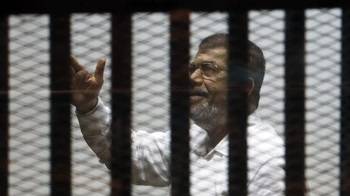Egypt's ousted president Mohamed Morsi has unveiled details about his location in the wake of last year's ouster by the military during a court hearing into alleged espionage charges on Saturday.
The session comes two days after unverified audio recordings – purportedly for Egyptian officials – were leaked, highlighting discussions on altering the features of a secret location where Morsi was being held in order to fall under the jurisdiction of the Interior Ministry.
Egypt's attorney general described the leaks as "fabricated" and ordered an investigation into the issue.
According to Egyptian law, a defendant must be held in prisons that fall under the jurisdiction of the Interior Ministry. If the arrest and detention procedures are invalid, the entire case can be nullified.
During Saturday's hearing, Morsi recalled that he was moved from the Republican Guard headquarters in eastern Cairo to several locations until he reached the Abu Qir naval base in the coastal province of Alexandria, where he was held from July 5 to November 4.
"I heard that the prosecutor in the Ittihadiya case saying that the Interior Minister had decided to consider the military base [Abu Qir naval base] as an Interior Ministry prison," Morsi told the presiding judge during the hearing.
"I will not go into further details because I fear for Egypt's national security. But if you want to know the truth, I will reveal it in a closed session in the presence of al-Sisi, [former chief of staff ] Sami Anan and [former defense minister] Hussein Tantawi," Morsi said.
At the beginning of the hearing, the defense demanded an investigation into the leaked recordings.
"If the arrest and detention procedures were proven invalid, all these cases [against Morsi] will be nullified," said defense attorney Montasser al-Zayyat told the court.
Morsi and 35 co-defendants, including leading members of his Muslim Brotherhood group, face charges of "conspiring" with Palestinian resistance group Hamas to carry out "terrorist acts" inside Egypt.
Morsi and his co-defendants emphatically deny all the charges against them, which they insist are politically driven.
Egypt's first-ever democratically elected leader, Morsi was ousted by the military last year – after only one year in office – following opposition protests against his presidency.
He currently faces multiple criminal charges, including incitement to murder, jailbreak and "offending Egypt's judiciary."
PHOTO CAPTION
Ousted Egyptian President Mohamed Mursi gestures behind bars during a trial of him and other leaders of the Muslim Brotherhood at a court in the police academy on the outskirts of Cairo, November 18, 2014.
Worldbulletin


 Home
Home Discover Islam
Discover Islam Quran Recitations
Quran Recitations Lectures
Lectures
 Fatwa
Fatwa Articles
Articles Fiqh
Fiqh E-Books
E-Books Boys & Girls
Boys & Girls  Hajj Rulings
Hajj Rulings Hajj Fatwas
Hajj Fatwas














